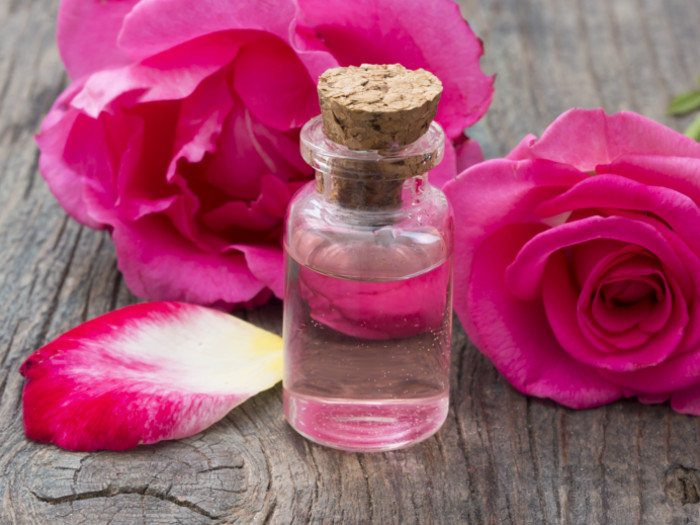Prized as a symbol of beauty, the rose has a number of health benefits that can keep you beautiful both inside and out.
What is Rose?
Rose is a flowering thorny shrub that is grown all over the world. With a pungent, sweet, distinctive scent, it is most often used as an ornamental flower, or in perfumes. However, you can eat the petals and rosehips, the small dark fruit that ripens on the plant in late summer. Rosehips, in particular, are an excellent source of vitamin C. [1]
Benefits
In Ayurvedic medicine, jam made from these flowers is prescribed for treating a multitude of ailments, such as the following:
- Digestive disorders
- Piles
- Immune System

Rosewater has many benefits apart from its fragrance. Photo Credit: Shutterstock
Anti-inflammatory: It is antibacterial and anti-inflammatory in nature. It contains a large number of phenolic compounds, which makes it popular for the treatment of the following:
- Ulcers
- Infections
- Nausea
Weight Loss: Rosehips and water are often recommended for weight loss regimens to help detoxify the body and promote urination.
Alzheimer’s Disease: An extract of this flower has also been shown to be helpful in fighting Alzheimer’s. [2]
Acne: It is used to treat acne naturally and is often added to personal care products for its soothing and skin-toning properties.
Skin Moisturizing: A few drops of the essential oil from this flower lightens your lip color, and the vitamin C in this flower helps keep your skin moisturized.
Stress: As a scent, rose oil has historically been used as an aphrodisiac but has recently been found to be effective against depression and stress as well.
Uses
There are many amazing uses of rose, such as follows:
- Skin Care: Rosewater, made by soaking the petals, as well as rose tea and jam made with the petals, are popular ways of using rose medicinally and for skin care.
- Face Wash: Topically, rose water is used as a face wash since it is mildly astringent and full of vitamin C, which helps in the production of collagen. [3]
- Gifting: Roses are often gifted to loved ones as they are beautiful and fragrant.
- Flavoring: Rose is popularly used as a flavoring in Turkey and the Middle East. Rosehips are also made frequently into a jelly.
- Fragrance: Roses are highly valued for their scent and are frequently used in perfumes and commercial fragrances.
Word of Caution: Women who are pregnant or breastfeeding should consult their doctor before using rose, as it may have an adverse hormonal or menstrual effect. The large amounts of vitamin C in rosehips can cause kidney stones if used in excess, and certain chemicals in this flower may interfere with blood clotting in high doses. So if you are undergoing surgery, avoid using any derivative products.
